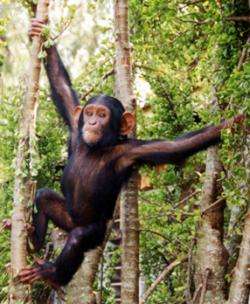(Phys.org)—Quite often, those people who take care of animals learn over time which are smarter than others. They don't need to test them, they see it in the way the animals behave. Unfortunately, that's not very scientific, so evolutionary anthropologists Esther Herrmann and Josep Call have devised a number of challenges for three groups of chimps to see if perhaps a measure of intelligence can be determined for a given species. They have published a report of their findings in Philosophical Transactions of the Royal Society B, one of which is the discovery that one chimp clearly stood out from the rest.
The challenges the two came up with for the chimps included such things as finding hidden food, showing them how to do something than seeing if the chimp could emulate it, using a tool to accomplish a task and others related to shape, color or size differentiation. They tested chimps at sanctuaries in Uganda and the Republic of Congo and a third group in a zoo in Germany. In so doing they found that there wasn't really any one thing that stood out as a hallmark of high intelligence among the groups. Instead, some chimps were found to be really good at some tasks and not so good at others. The one exception was a chimp named Natasha who scored very high on all the tests, leading the researchers to label her exceptional.
Those who take care of Natasha have been saying as much all along. She'd become notorious for her antics at the Ngamba Island Chimpanzee Sanctuary, where she resides. She escapes enclosures that hold other apes, at one point using branches to figure out if an electric fence was working. She teases handlers and visitors to the park and sometimes squirts them with water. When asked, all of those who worked with her at the park put her name on the list of the smartest in the group.
Pinning down just what exactly high intelligence means however, is not so easy to do. With people, tests have been devised that may or may not be true measures of exceptional intelligence, and as with the chimps, some people who are capable of genius in some areas such as painting, may be average at best in other areas. Thus the term genius has become a loosely defined label if ever there was one. Thus the researchers are hesitant to apply the term to Natasha, despite the fact that she is clearly smarter than any other chimp tested.
More information: Are there geniuses among the apes? Phil. Trans. R. Soc. B, 5 October 2012 vol. 367 no. 1603 2753-2761 doi: 10.1098/rstb.2012.0191
Abstract
We are often asked whether some apes are smarter than others. Here we used two individual-based datasets on cognitive abilities to answer this question and to elucidate the structure of individual differences. We identified some individuals who consistently scored well across multiple tasks, and even one individual who could be classified as exceptional when compared with her conspecifics. However, we found no general intelligence factor. Instead, we detected some clusters of certain abilities, including inferences, learning and perhaps a tool-use and quantities cluster. Thus, apes in general and chimpanzees in particular present a pattern characterized by the existence of some smart animals but no evidence of a general intelligence factor. This conclusion contrasts with previous studies that have found evidence of a g factor in primates. However, those studies have used group-based as opposed to the individual-based data used here, which means that the two sets of analyses are not directly comparable. We advocate an approach based on testing multiple individuals (of multiple species) on multiple tasks that capture cognitive, motivational and temperament factors affecting performance. One of the advantages of this approach is that it may contribute to reconcile the general and domain-specific views on primate intelligence.
Journal information: Philosophical Transactions of the Royal Society B
© 2012 Phys.org





















